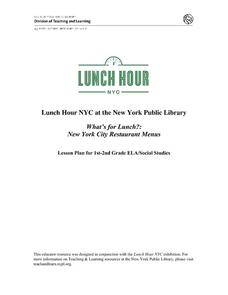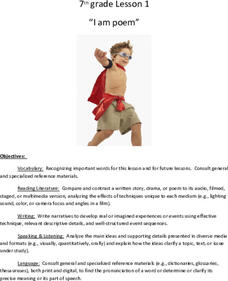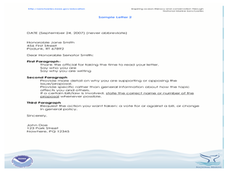Curated OER
Sound Blending Lesson Plan
Mr. Snowman wants to help emerging readers understand compound words, so he segments some familiar words to help them see that they are made of two distinct words. Learners repeat the words, both segmented and blended, and observe them...
Curated OER
A "Teacher Appreciation Week" Card for the Teacher
Anyone can create Teacher Appreciation Week cards for their teachers. This activity is designed to be incorporated with an art class. Learners will design a card and discuss ways to show appreciation for their teacher. Resource links are...
Curated OER
Getting Started: Pre-Writing Techniques
Pre-writing activities are covered to help your students examine topics and personal experiences. Your class will discover how to choose topics which create a strong piece of writing and incorporate personal knowledge.
Curated OER
How Do Artists Effectively Relate Historic Events?
Students explore African American migration. In this black culture and history lesson, students use a map to identify northern and southern states in which African Americans lived in the 1900s. Students observe and describe objects and...
Curated OER
Getting nosy
A nose knows! Connect animals to their noses with a fun science activity. Animals include elephants, rats, pigs, and even humans. For a science exploration, kindergartners answer questions about what they can smell. A great addition to...
New York Public Library
What's for Lunch?: New York City Restaurant Menus
Do you remember the days when a cup of coffee cost five cents? At A.W. Dennett restaurant in 1894, you could buy a five-cent cup of coffee and as well as a five-cent slice of pie to accompany it. The menu from that year is a primary...
Lerner Publishing
Living or Nonliving
It's alive! Or is it? Through a series of shared readings, whole class activities, and independent exercises children explore the difference between living and non-living things, creating a pair of printable books to demonstrate their...
US Citizenship and Immigration Services
Thanksgiving 1—Pilgrims and American Indians
The Pilgrims first arrived in America in order to gain religious freedom. Here is a instructional activity that takes the class on this journey with the Pilgrims, stopping to look at how they got here, who they met when they arrived, and...
Utah Education Network (UEN)
7th Grade Poetry: I Am Poem
A study of Alfred Noyes's poem "The Highwayman" opens a lesson about narrative poetry. Scholars read the poem and compare it to the animated video version using a worksheet. Learners look at models and use a template to craft an "I Am"...
Curated OER
Modeling Mania Math Topic: Using Models
Learners examine problem solving techniques when working on spatial problems. They discover how models, sketches, and drawings can be used to understand on something works. They design a model of a bridge using given dimensions and...
Curated OER
For the Birds
Second graders observe, identify, and document birds sighted at the library feeder station. They observe and document birds in order to begin their birder's life list. They apply scientific concepts and principles by using library...
Curated OER
Using Wordless Comics To Help Create Meaning in Reading
Use picture cues as a tool in order to create meaning along with text. With a wordless comic, young illustrators discuss the main idea and character traits, and independently write a summary for a page of a wordless comic. This strategy...
Curated OER
In My Opinion
Young writers craft letters to the government stating their opinion on different topics. They pick an environmental or ocean issue, research it, and craft their formal persuasive letter. Ensure your learners include supporting facts and...
Google
Beginner 4: Searching for Evidence for Research Tasks
Having a strong searching skill set can make a research project much easier and much for successful for pupils. Tackle finding evidence with the ideas included here. The ultimate goal is for class members to learn the stepping stones...
Channel Islands Film
Lone Woman of San Nicolas Island: Lesson Plan 4
Imagine being stranded all alone on an island for 18 years. How would you survive? Class members are challenged to makes necessities out of natural materials that would likely be found on an island.
EngageNY
End of Unit Assessment: Fishbowl Discussion
Is it worth it? Scholars complete the end of unit assessment by participating in a fishbowl discussion to consider if the benefits of DDT outweigh the consequences. They reflect on their discussions by completing an exit ticket.
EngageNY
Speaking and Listening Skills: Practice
After reviewing their resources from the unit, scholars participate in multiple group discussions with a World Café activity. During the discussions, they share ideas about their focus questions pertaining to Canada's natural resources...
EngageNY
End of Unit Assessment, Part 2: Research and Response
Talk it out. Scholars complete part two of the assessment by participating in a World Café discussion activity. Learners circulate the room, sharing their ideas and thoughts about Canada's natural resources using quotes and paraphrasing...
EngageNY
Building Background Knowledge: Competing Views Regarding Mining on Inuit Lands
Scholars build background knowledge about mining on Inuit lands. Working in small groups, they sort information about the Inuit onto a point of view chart to determine if mining is beneficial to Inuit communities.
Utah Education Network (UEN)
8th Grade Poetry: Narrative Poem
The first lesson of a five-lesson unit designed for eighth graders has class members reading and watching a video of Edgar Allen Poe's narrative poem, "The Raven." They then craft their narrative poem, illustrate it, and share their work...
Curated OER
Dinosaur Designs
Second graders examine facts that can be found in nonfiction books. They listen to a read aloud of Patrick's Dinosaur, with time before the end for student predictions. They make dinosaur t-shirts using facts from the book.
Curated OER
Hudson Canyon Expedition Let's Bet on Sediments!
Students investigate and analyze the patterns of sedimentation in the Hudson Canyon students observe how heavier particles sink faster than finer particles. They study that submarine landslides (trench slope failure) are
Curated OER
AdVENTurous Findings on the Deep Sea Floor
Students conduct investigations to observe formations of precipitates, then create models of developing hydrothermal vents. They compare the models with the actual hydrothermal vents developing along the Galapagos Rift.
Curated OER
Superbugs
Students research deep sea communities and discover strategies for combating antimicrobial resistance and write reports on it. They consider overprescription and prophylactic uses of antibiotics as causes for their ineffectiveness.

























